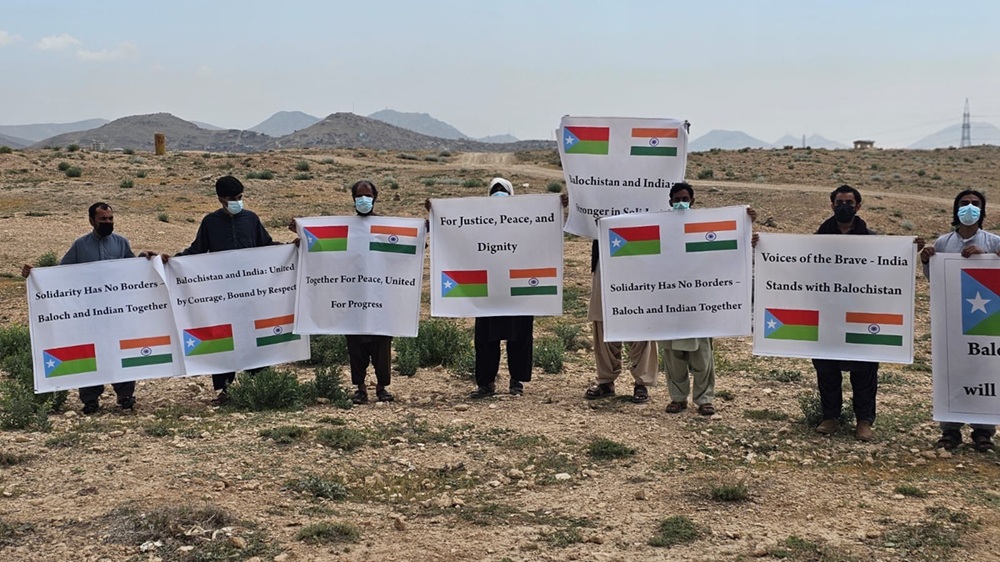The Balochistan Liberation Army (BLA) and other nationalist leaders have intensified their push for an independent Balochistan. The declaration of independence, appeals for international recognition, and symbolic acts of defiance have marked a significant escalation in the decades-long struggle for autonomy in the resource-rich southwestern province of Pakistan.
Declaration of Independence and International Appeals
On May 14, 2025, Baloch leader Mir Yar Baloch publicly proclaimed that Balochistan has never been a part of Pakistan, citing decades of "air bombings, enforced disappearances, and genocide" by the Pakistani government. He urged the Indian media to refrain from labeling Balochs as "Pakistan's Own People," asserting a distinct Baloch identity.
The declaration of independence by Baloch leaders sparked a social media trend under the banner “Republic of Balochistan announced.” Leaders of the Free Balochistan Movement proclaimed the region's independence and appealed for international support, including a call for a United Nations peacekeeping mission to safeguard their claim. One of the movement’s leaders also requested that India rename Jinnah's House to ‘Balochistan House,’ symbolizing a shift in identity and support for their cause.
Operation Herof 2.0: A Surge in Insurgency
The BLA has intensified its insurgent activities against the Pakistani government through a newly launched campaign, 'Operation Herof 2.0.' This extensive operation involved 78 coordinated attacks across 58 locations in Balochistan, primarily targeting military and security positions. Notably, the BLA carried out seven attacks within a 24-hour timeframe and reportedly executed several intelligence agents.
These actions signify a sustained and widespread resistance movement against Pakistan's authority in the region. Amid these developments, Mir Yar Baloch has declared Balochistan's independence, further highlighting the area's rejection of Pakistani governance and its institutions.
Symbolic Acts of Defiance
In a powerful display of defiance, Baloch activists have been removing Pakistani flags and replacing them with the Balochistan flag across the region. This act symbolizes the rejection of Pakistani authority and the assertion of a distinct Baloch identity. Such symbolic gestures have been accompanied by attacks on stores selling Pakistani flags, with the BLA warning shop owners against selling national flags and celebrating Pakistan's Independence Day.
Human Rights Concerns and International Advocacy
The Baloch Human Rights Council (BHRC) has urged the United Nations to take immediate and decisive action to end the exploitation and repression in Balochistan. The BHRC highlighted the systematic exploitation of Balochistan’s natural resources by Pakistan and China, leading to mass displacement and environmental degradation. The implementation of the China-Pakistan Economic Corridor (CPEC) has been particularly contentious, with the BHRC describing it as a “corridor of death and destruction” for the Baloch people.
Additionally, various NGOs have characterized the situation in Balochistan as a "slow-motion genocide," citing military operations, enforced disappearances, extrajudicial killings, and a consistent denial of basic human rights. These organizations have called on the United Nations Human Rights Council to address these grave violations with urgency.
Appeals to India and Geopolitical Implications
Naela Quadri, Prime Minister of the Balochistan government-in-exile, has sought the support of Indian Prime Minister Narendra Modi at the United Nations for Balochistan's freedom from Pakistan's "illegal occupation." She emphasized the historical independence of Balochistan and accused Pakistan, along with China, of exploiting the region's resources and committing atrocities against its people.
The BLA has also openly aligned itself with India’s counter-terrorism posture in South Asia, branding Pakistan as a "terrorist state." This declaration signifies a dramatic shift in rhetoric and strategy by the BLA, positioning itself not only as a regional liberation force but also as a potential military partner in reshaping the subcontinent’s security architecture.
Pakistan's Response and Accusations
In response to the escalating insurgency, Pakistan has accused India's external intelligence agency, RAW, of triggering violence and unrest in Balochistan. The Chief Minister of Balochistan specifically pointed to India's role in funding the BLA after recent violent incidents. Pakistan's military has also increased its defense budget by 18% for 2025–26, reflecting the growing security challenges.
Conclusion
The situation in Balochistan has reached a critical juncture, with separatist movements gaining momentum and international attention. The declarations of independence, appeals for international support, and intensified insurgent activities underscore the region's volatile dynamics. As the Baloch people seek recognition and support for their cause, the international community faces a complex challenge in addressing the aspirations for autonomy while ensuring regional stability.
